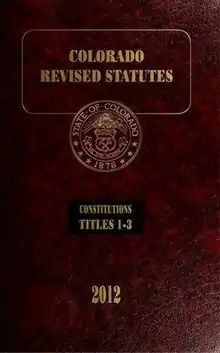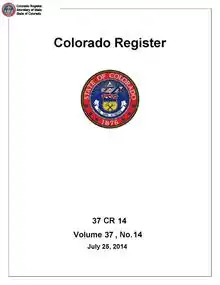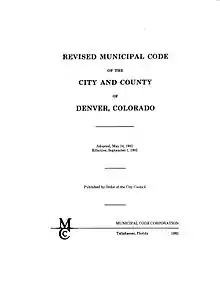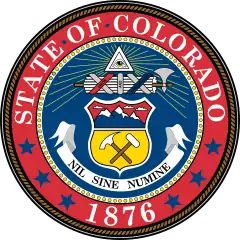Law of Colorado
The law of Colorado consists of several levels, including constitutional, statutory, regulatory, local, and case law. The Colorado Revised Statutes form the general statutory law.
Sources

The Constitution of Colorado is the foremost source of state law. Legislation is enacted by the Colorado General Assembly, published in the Session Laws of Colorado, and codified in the Colorado Revised Statutes. State agencies promulgate regulations in the Colorado Register, which are in turn codified in the Code of Colorado Regulations. Colorado's legal system is based on common law, which is interpreted by case law through the decisions of the Supreme Court and the Court of Appeals, which are published in the Colorado Reporter and Pacific Reporter. Counties and municipalities may also promulgate local ordinances. In addition, there are also several sources of persuasive authority, which are not binding authority but are useful to lawyers and judges insofar as they help to clarify the current state of the law.
Constitution
The foremost source of state law is the Constitution of Colorado, which like other state constitutions derives its power and legitimacy from the sovereignty of the people. The Colorado Constitution in turn is subordinate only to the Constitution of the United States, which is the supreme law of the land.
Legislation
Pursuant to the state constitution, the Colorado General Assembly has enacted various laws. The bills and concurrent resolutions passed by a particular General Assembly session, together with those resolutions and memorials designated for printing by the House of Representatives and the Senate, are contained in the Session Laws of Colorado.[1] These in turn have been codified in the Colorado Revised Statutes (C.R.S.).[1]
Regulations

Pursuant to certain broadly worded statutes, state agencies have promulgated an enormous body of regulations, published in the Colorado Register and codified in the Code of Colorado Regulations (CCR), which carry the force of law to the extent they do not conflict with any statutes or the state or federal Constitutions.
Case law
Colorado's legal system is based on a political party common law. Like all U.S. states except Louisiana, Colorado has a reception statute providing for the "reception" of English law. All statutes, regulations, and ordinances are subject to judicial review. Pursuant to common law tradition, the courts of Colorado have developed a large body of case law through the decisions of the Colorado Supreme Court and the Colorado Court of Appeals.
There is no official reporter. The Colorado Reporter (a Colorado-specific version of the Pacific Reporter) is an unofficial reporter for appellate decisions from 1883.[2][3] Decisions of the Colorado Supreme Court were published in the official Colorado Reports from 1864 to 1980, and decisions of the Court of Appeals were published in the official Colorado Court of Appeals Reports from 1891 to 1980.[2][3]
Local ordinances

Colorado is divided into 64 counties, as well as some 271 active incorporated municipalities, including 196 towns, 73 cities, and two consolidated city and county governments.
Colorado counties have the authority to adopt and enforce ordinances and resolutions regarding health, safety, and welfare issues "as otherwise prescribed by law" which are not in conflict with any state statute,[4][5] as well as the power to adopt ordinances for control or licensing of those matters of purely local concern in a number of policy areas.[6][7] All such ordinances of a general or permanent nature and those imposing any fine, penalty, or forfeiture must be published.[8]
Colorado municipalities have the power to adopt ordinances which are necessary and proper to provide for the safety, preserve the health, promote the prosperity, and improve the morals, order, comfort, and convenience of the municipality and its inhabitants and which are not in conflict with any laws,[9] and have the power to enforce them with fines of up to $2,650.00, imprisonment for up to one year or both.[10] All such ordinances of a general or permanent nature and those imposing any fine, penalty, or forfeiture must be published in a local newspaper, or three local public places otherwise.[11]
See also
Topics
Other
- Politics of Colorado
- Law enforcement in Colorado
- Crime in Colorado
- Law of the United States
References
- Hamilton 2008, p. 113.
- Oesterle, Dale A.; Collins, Richard B. (2002). The Colorado State Constitution: A Reference Guide. Greenwood Publishing Group. p. 27. ISBN 0-313-30849-7. LCCN 2001045241.
- Larsen, Sonja; Bourdeau, John (1997). Legal Research for Beginners. Barron's Educational Series. p. 268. ISBN 0-8120-9768-8. LCCN 96-39398.
- C.R.S. § 30-11-101
- C.R.S. § 30-15-411
- C.R.S. § 30-15-401
- C.R.S. § 30-15-101 et seq.
- C.R.S. § 30-15-405
- C.R.S. § 31-15-103
- C.R.S. § 31-16-101
- C.R.S. § 31-16-105
- Hamilton, Andrea L. (August 2008). "Conducting Colorado Legislative History Research" (PDF). The Colorado Lawyer. 37 (8): 113–115. Archived from the original (PDF) on 2013-10-04.
- Brown, Douglas G.; Pike, Charles W. (June 1997). "The Colorado Revised Statutes: A Glimpse at the State's Obligation—Past, Present, and Future". The Colorado Lawyer. 26 (6): 97–102. Archived from the original on 2015-09-12.
External links
- Colorado Revised Statutes from LexisNexis
- Colorado Revised Statutes from the Colorado Office of Legislative Legal Services
- Colorado Revised Statutes from Public.Resource.Org
- Code of Colorado Regulations from the Colorado Secretary of State
- Session Laws of Colorado from the Office of Legislative Legal Services
- Colorado Session Laws Digital Collection from the University of Colorado Law School
- Colorado Register from the Colorado Secretary of State
- Supreme Court and Court of Appeals opinions from the Colorado Bar Association
- Supreme Court opinions from the Colorado State Court Administrator
- Court of Appeals opinions from the Colorado State Court Administrator
- Denver Revised Municipal Code from Municode
- Local ordinance codes from Public.Resource.Org
- Case law: "Colorado", Caselaw Access Project, Harvard Law School, OCLC 1078785565,
Court decisions freely available to the public online, in a consistent format, digitized from the collection of the Harvard Law Library

